
June 9 seminar
The Higher Education Research Centre hosted a seminar on June 9th in DCU entitled “What can we learn from research to better support adult learners in higher education”. The seminar was supported by the National Forum for the Enhancement of Teaching and Learning in Higher Education and was part of their seminar series 2014.
HERC’s director, Professor Maria Slowey, opened the seminar with an analysis of the typology of adult learners in higher education, namely: second chance learners; equity groups; deferrers; recurrent learners; returners; refreshers; learners in later life. She continued by stating that according to Bloom (2012), aging is accelerating everywhere. Demographic trends for Ireland 1950-2050 showed that the over 60 population has increased from 15.2% of the population in 1950 to 16.5% in 2010, and that there is a projected substantial increase to 23.2% in 2030 and 28.7% in 2050
Since its foundation, DCU has been committed to widening access to higher education through research, civic engagement, and providing education over the lifecourse. DCU is the first Irish HEI to have adopted generic principles (10) for an 'Age Friendly University' that were identified by an interdisciplinary working group and have been adopted by partner universities in Ireland, the UK and the USA.
With regards to the “education over the lifecourse” pillar, Professor Slowey said that statistics show Ireland is underperforming in literacy means and there is a sizeable gap (approximately 20 points) between the 16-24 and the 55-64 age groups, with the young cohort outperforming their older counterparts. Moreover, there is increased likelihood of adults scoring at level 4/5 in literacy reporting high earnings, high levels of trust and political efficacy, good health, participating in volunteer activities and being employed, compared with adults scoring at or below level 1(between 2 and 3 times increase).
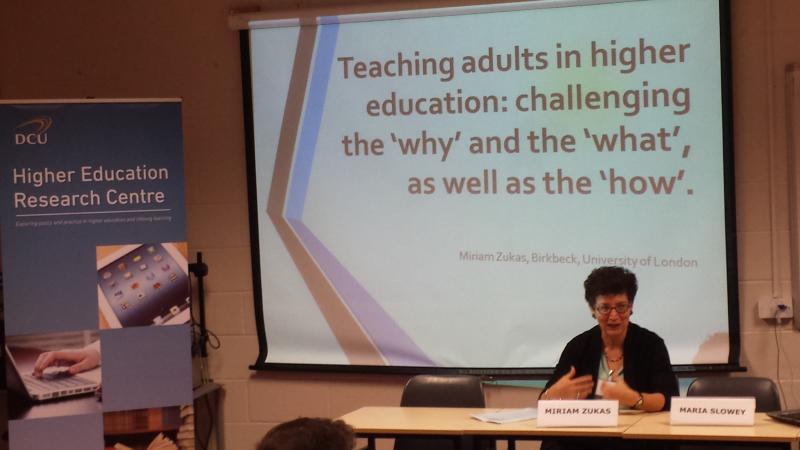 Professor Slowey then introduced the keynote speaker, Professor Miriam Zukas, Executive Dean of the School of Social Science, History and Philosophy, Birkbeck College, University of London. Professor Zukas pondered as to the reasons for her invitation to the event “given that I come from another country and work in a different HE system with all its faults”. She concluded there were three reasons: her substantial involvement (30 years) with university adult education; her writings on the topic of ‘pedagogic identities’ in higher, adult and further education; and her position in what she referred to as “an extraordinary institution with nearly two hundred years of university education for adults”.
Professor Slowey then introduced the keynote speaker, Professor Miriam Zukas, Executive Dean of the School of Social Science, History and Philosophy, Birkbeck College, University of London. Professor Zukas pondered as to the reasons for her invitation to the event “given that I come from another country and work in a different HE system with all its faults”. She concluded there were three reasons: her substantial involvement (30 years) with university adult education; her writings on the topic of ‘pedagogic identities’ in higher, adult and further education; and her position in what she referred to as “an extraordinary institution with nearly two hundred years of university education for adults”.
In order to justify the last point, Professor Zukas quoted a few key excerpts from Birkbeck’s charter. These included the fact that the Institution has a responsibility to promote and provide education, instruction and means for research to ‘persons who are engaged in earning their livelihood during the daytime’. She therefore argued that we need to go back further to our roots to understand better the social and political purpose which informs Birkbeck. Professor Zukas then mentioned the two main traditions that inspired Birkbeck. The first one was a ‘very generous and broad-minded view of the needs of those who could spare time from their work for study’ (George Birkbeck). The second tradition is about opening up the university to those who “desire knowledge, not diplomas or degrees” (the extension movement), and the Institution offering “its treasures freely to all who can benefit of them and sincerely desire to do so”.
She concluded that these two traditions invite us to challenge the hegemonic belief which underlies much thinking about higher education today – the mistaken belief that the purpose of university education should be understood solely as preparation for work.
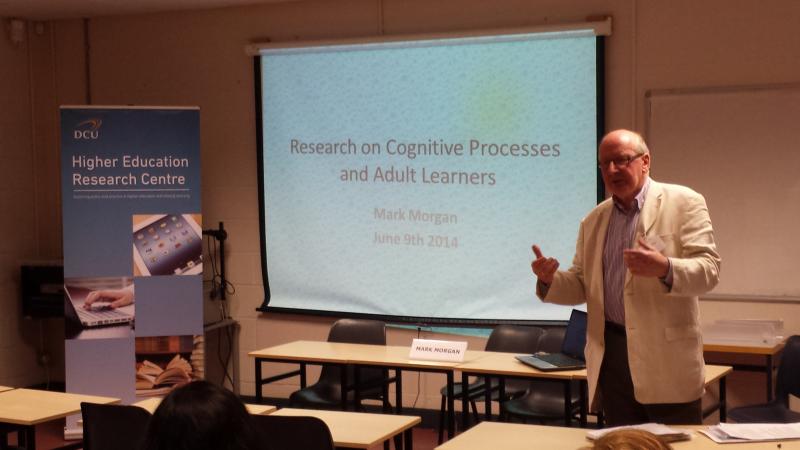 The keynote speech was followed by three presentations on the research carried out in the field. Professor Mark Morgan - Cregan Professor of Education and Psychology, Emeritus, St Patrick’s College Drumcondra and Coordinator Growing Up in Ireland, Trinity College Dublin - focused on research on Cognitive Processes and Adult Learners. He initially gave some examples of decline in abilities with age, e.g. speed of acquiring new knowledge decreases from 40+ on (fluid cognition) and crystallised ability (acquired knowledge) increases until at least 60 and then gradually declines. He did point out that there are differences across areas such as age at which best work is done, depends on whether the profession places a premium on novel problem solving (maths, theoretical physics) or accumulated knowledge (history, philosophy) is important (earlier peak for the former).
The keynote speech was followed by three presentations on the research carried out in the field. Professor Mark Morgan - Cregan Professor of Education and Psychology, Emeritus, St Patrick’s College Drumcondra and Coordinator Growing Up in Ireland, Trinity College Dublin - focused on research on Cognitive Processes and Adult Learners. He initially gave some examples of decline in abilities with age, e.g. speed of acquiring new knowledge decreases from 40+ on (fluid cognition) and crystallised ability (acquired knowledge) increases until at least 60 and then gradually declines. He did point out that there are differences across areas such as age at which best work is done, depends on whether the profession places a premium on novel problem solving (maths, theoretical physics) or accumulated knowledge (history, philosophy) is important (earlier peak for the former).
Professor Morgan then explored the reasons why adults do so well. The main points offered included the “brain reserve hypothesis” (can tolerate age-related changes); distinction between typical (everyday) and maximal (cognitive tests) functioning; more reliance on past experiences (novel problem solving less important as we get older); accumulated stock of knowledge (better performance in old age with cross-word puzzles); experience of setbacks (the contribution of resilience). He went on to point out the significance of informal learning for adults in terms of continuity of academic learning with everyday discourse, the fact that interested adults can build a store of relevant expertise and knowledge and the importance of life experience (parenting)
Professor Morgan’s presentation ended with the research gaps in that area. There has been no link of current research with experiences of mature students; there is lack of research on induction programmes; lack of evidence that lapses of memory may not matter and explanations on why most adult learners opt for a degree in history or english.
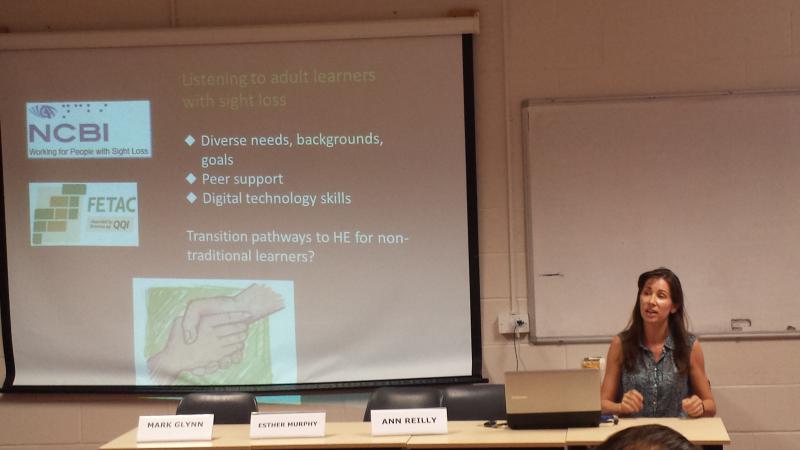
The second presentation by Dr. Esther Murphy - Centre for Inclusive Technology (CFIT), NCBI – focused on peer support and digital technology research to support adult learners with disabilities in further and higher education. Her primary area of research deals with working for people with sight loss and more specifically finding transition pathways to higher education for non-traditional/adult learners. Listening to adult learners with sight loss is essential due to their diverse needs, backgrounds and goals. Esther highlighted the universal design for learning (UDL)'s main principles to enable educators facilitate their students with disabilities full participation, multiple means of representation; action and expression; engagement for people with disabilities.
Dr Murphy developed and ran a collaborative workshop between the Center for Inclusive Technology & Trinity College Dublin on digital inclusion for students with sight loss in higher education (2013). Student experiences led facilitated discussions at the workshop with all stakeholders, access barriers and facilitators were identified which led to Dr. Murphy's development of a new pilot research project focused on profiling senior cycle students with sight loss in Ireland. It commenced in April 2014 and is funded by the Higher Education Authority and supported by TCD and AHEAD.
The traditional model of delivering digital literacy skills training chiefly through VET (Vocational Education and Training) centres is becoming unsustainable, due to a massive increase in demand for such training and continual rapid changes in online and mobile technologies which make it difficult for training to keep pace. To help develop their digital skills, people with disabilities naturally look to their peers for support, advice and information sharing. To address this issue, Dr. Murphy along with the CFIT team (including HERC's Dr. Emma Murphy) developed the European wide project DICE – Digital Inclusion Champions in Europe project. DICE aims to help people with disabilities build the digital literacy skills needed to transition from VET centre training to mainstream education and employment, by creating an online community based on a peer support model, promoted and sustained by Digital Inclusion Champions. Starting in the four partner countries of Ireland, Belgium, Poland and Bulgaria, the DigiPlace4All community will spread nationally and internationally via appointed Digiplace4All Champions and innovative ‘twinning’ relationships between VET centres in different countries.
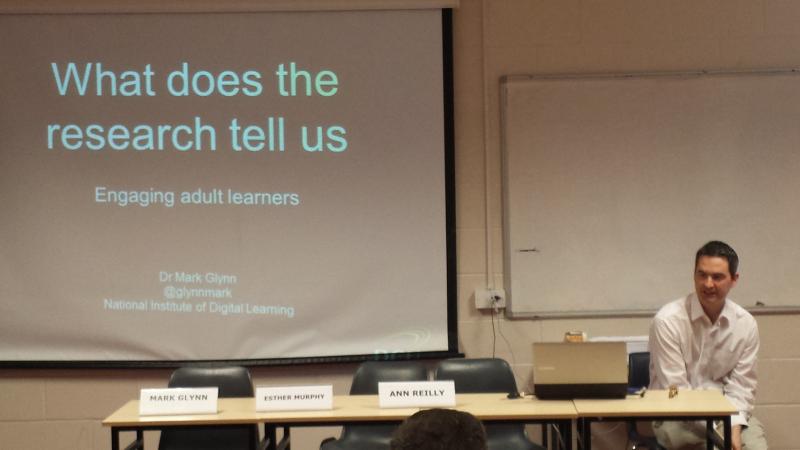 The last presentation by Dr Mark Glynn - Head Teaching Enhancement Unit (TEU), DCU – examined what research reveals about engaging adult learners. According to an OECD report (2008), 42% of the 25 to 34 age cohort in Ireland has attained tertiary education compared to an OECD average of 33%. However, only 17% of the 55 to 64 age cohort has done so compared with 19% for the OECD as a whole. Kuh (2001) suggests that 20 years of research have identified that students who are engaged in college life have a higher quality experience than those at institutions where engagement is not promoted. As Coates (2010) states, “contemporary perspectives of student engagement now touch on aspects of teaching, the broader student experience, learners’ lives beyond University, and institutional support”.
The last presentation by Dr Mark Glynn - Head Teaching Enhancement Unit (TEU), DCU – examined what research reveals about engaging adult learners. According to an OECD report (2008), 42% of the 25 to 34 age cohort in Ireland has attained tertiary education compared to an OECD average of 33%. However, only 17% of the 55 to 64 age cohort has done so compared with 19% for the OECD as a whole. Kuh (2001) suggests that 20 years of research have identified that students who are engaged in college life have a higher quality experience than those at institutions where engagement is not promoted. As Coates (2010) states, “contemporary perspectives of student engagement now touch on aspects of teaching, the broader student experience, learners’ lives beyond University, and institutional support”.
Dr Glynn then mentioned the Student Engagement Indices that the TEU have developed that include: 1. Academic Challenge -the extent to which expectations and assessments challenge students to learn; 2. Active Learning - students’ efforts to actively index knowledge; 3. Student Staff Interactions - the level and nature of students’ contact and interaction with teaching staff; 4. Enriching Educational Experiences - students’ participation in broadening educational activities; 5. Supportive Learning Environment - students’ feelings of support within the University community; and 6. Work Integrated Learning - integration of employment-focused work experiences into study. According to the latest results that will be published soon, the 19 and under age cohort performs worst in indices 1, 2, 3 and 6.
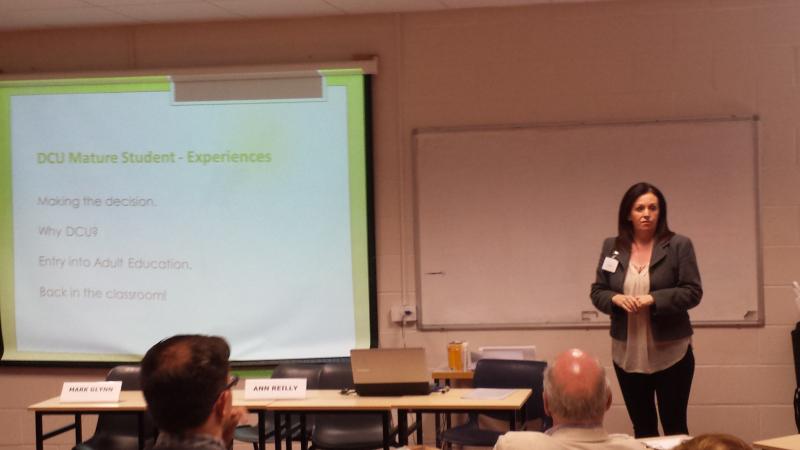 The seminar also had a very interesting contribution by Mrs Ann Reilly, the former Chair of the Mature Student Society of DCU. She talked about the difficulties and barriers that mature students face when studying in DCU. They range from busy schedules juggling study and family life, to facing problems with ICT use, lack of interaction with the younger students and lack of a space specifically assigned to mature students for their socialization. Mrs Reilly inspired the audience with her personal story and gave useful pieces of advice in the ways that helped her successfully complete her studies and even be contemplating undertaking a PhD in the near future.
The seminar also had a very interesting contribution by Mrs Ann Reilly, the former Chair of the Mature Student Society of DCU. She talked about the difficulties and barriers that mature students face when studying in DCU. They range from busy schedules juggling study and family life, to facing problems with ICT use, lack of interaction with the younger students and lack of a space specifically assigned to mature students for their socialization. Mrs Reilly inspired the audience with her personal story and gave useful pieces of advice in the ways that helped her successfully complete her studies and even be contemplating undertaking a PhD in the near future.
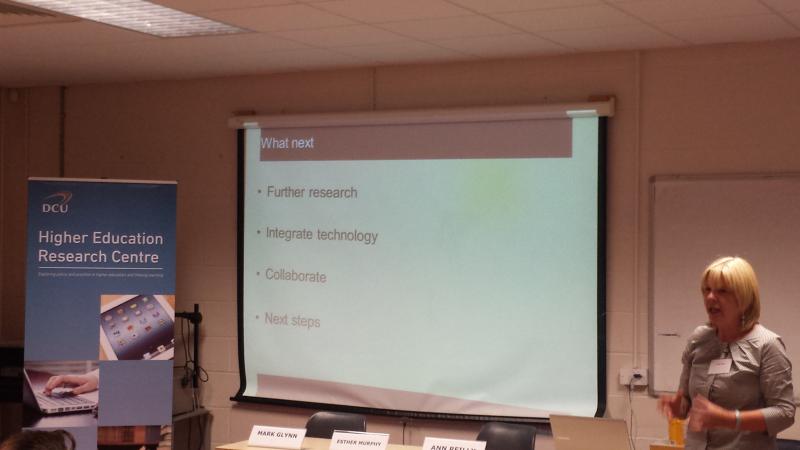 The last part of the seminar was devoted to a brainstorming session, led by Professor Anne Ryan, Department of Adult and Community Education, NUIM. The participants were asked to identify the priority themes for research in the field of adult education which could also be areas that are under-researched thus far. The participants were asked to group research themes that would benefit the learner, the educator and the system separately; the main three themes from each category are presented below:
The last part of the seminar was devoted to a brainstorming session, led by Professor Anne Ryan, Department of Adult and Community Education, NUIM. The participants were asked to identify the priority themes for research in the field of adult education which could also be areas that are under-researched thus far. The participants were asked to group research themes that would benefit the learner, the educator and the system separately; the main three themes from each category are presented below:
1. Benefit the Learner
- Exploring diversity within mature student/adult learners – using typology – to address different needs, perspectives etc.
- Interaction of younger and older learners in HE
- Becoming isolated: what supports are in place for mature students?
2. Benefit the Educator
- Who are the lecturers/teachers of adult learners: what are their philosophies and motivations?
- Impact of resources (staff) on mature student participation: mapping of existing provision
- The impact of IT skills on engagement, retention and achievement
3. Benefit the System
- Why have some institutions more adult learners?
- Alternative methods for collecting data from learners: Ethnography?
- Understanding the student experience which is varied, complex and diverse
